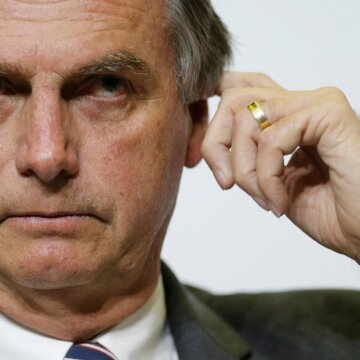- About
- Topics
- Picks
- Audio
- Story
- In-Depth
- Opinion
- News
- Donate
- Signup for our newsletterOur Editors' Best Picks.Send
Read, Debate: Engage.
| topic: | Transparency and Corruption |
|---|---|
| located: | Brazil |
| editor: | Ellen Nemitz |
The administration of Brazillian President Jair Bolsonaro has been increasingly contested by politicians and citizens who disagree with his policies, mostly when it comes to economic liberalism and the weakening of environmental laws.
Recently, Bolsonaro’s mishandling of the coronavirus pandemic became the main target of criticism, as it has taken the lives of more than 500,000 Brazilians - a number that could be 80 percent lower, according to estimates, had adequate measures been taken.
The Parliamentary Inquiry Committee, which is investigating the actions of Bolsonaro since the COVID-19 outbreak began, has made a serious accusation according to which the government has negotiated the Indian Covaxin vaccine at a much higher price in order to get illegal financial advantages.
While the scandal of corruption was coming under the spotlight, the Environment Minister Ricardo Salles resigned due to several accusations of being part of a scheme to sell illegally logged wood from the Amazon forest. The excitement surrounding this long anticipated news did not last much, as the one who came to replace Salles was the former member of the Brazilian Rural Society, Joaquim Álvaro Pereira Leite, who appears to be just another supporter of the anti-environment agenda.
In the meantime, a bill regarding indigenous lands’ demarcation has passed in the Deputies House - a first step to becoming a law. The 2007 bill (number 490) threatens the original people’s territories by changing the rules of demarcation. The result, according to NGOs, could be the irreversible destruction of vast areas of forests, currently protected by these communities, in favour of economic interests.
On the one hand, Jair Bolsonaro’s government is becoming weaker. An increasing number of Brazilians declare that they regret their vote in 2018 and take to the streets along with those who demand Bolsonaro’s impeachment, which isn't likely to happen, however, since there aren’t enough deputies supporting the idea in order to approve it, despite numerous formal requests.
On the other hand, the president has been garnering support in the Congress that sustains his truculent rhetoric and actions. In addition, there is a loyal base of voters still declaring support to Bolsonaro’s reelection aspirations.
The forces that maintain Bolsonaro’s seat are able to keep running the country without changing course; they would shift some pieces on the chess board, at most, but never give up their main goals. Such goals and the tactics used to achieve them are shared by other far-right politicians all across the globe: the promotion of the economic interests of a privileged few and the dissemination of a (false) morality based on hatred of minorities, using fake news items and social media platforms.
The end of Bolsonaro’s era will not be spelled by a corruption scandal or yet another one of his attempts to damage the environment, because those who support him still believe he has nothing to do with it or, in some cases, strongly agree with his objectives, especially regarding the environmental costs of economic development.
Therefore, a solid political union against Bolsonaro must be formed ahead of the 2022 election, as well as and reliable information sources to count on during the process of choosing Brazil’s next president and legislative houses.
Image: Jeso Carneiro.

